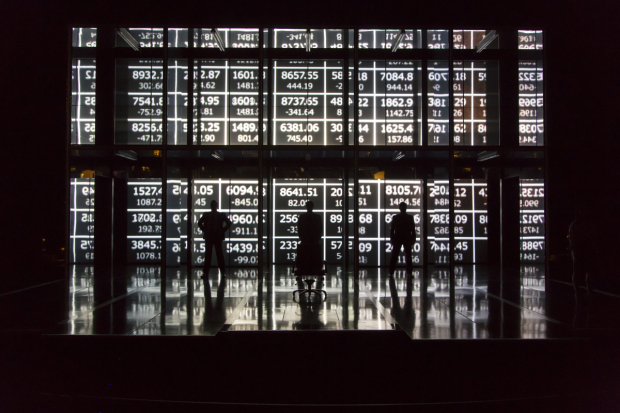
(© T Charles Erickson)
You need to see Junk. Right now. This epic new Broadway show at Lincoln Center Theater is not only the most important play you'll see all year, but the most entertaining. That's not something one might expect from a story about the world of high finance, with a title that conjures a pile of garbage. But playwright Ayad Akhtar (Disgraced) once again proves his talent for illuminating the forces running our world, forces that would prefer to remain in the dark.
It's 1985 and Robert Merkin (Steven Pasquale playing a character whose name smacks of both Michael Milken and a pubic toupee) is the king of junk bonds (high-yield, high-risk debt securities). He uses them to raise money for scrappy young entrepreneurs like Israel Peterman (Matthew Rauch), who is looking to stage a hostile takeover of Everson Steel, a major employer listed on the Dow Jones. Third generation C.E.O. Thomas Everson Jr. (Rick Holmes) thinks it is preposterous that an upstart could seize control of his family's company. But his investment banker, Max (Henry Stram), reminds him that it is a publicly traded company: If the shareholders sell a majority stake to Peterman, it's his. Merkin knows how to win in this game, but he would never want Everson for himself: Why make steel when you can make debt? It's a far more lucrative product, especially if you worship at the altar of the market.
With a cast of 23, Junk is Shakespearean in its outsize scope and dramatis personae. In a performance that is both sympathetic and vexatious, Holmes plays the blinkered Richard II to Pasquale's Henry Bolingbroke. Merkin has a Lady Macbeth in his wife, Amy (a fiery Miriam Silverman), who cheers him on behind the scenes. Private equity magnate Leo Tressler (the hilariously growly Michael Siberry) sees himself as the Macduff who will save America from Merkin and his unsavory usurpers — men like Boris Pronsky (Joey Slotnick playing a much thinner but just as hapless Reagan-era Falstaff).
Thrillingly, Akhtar further complicates this ecosystem: The fourth estate is represented by reporter Judy Chen (a spunky Teresa Avia Lim). Law enforcement comes into the picture with U.S. attorney Guiseppe Addesso (an untrustworthy Charlie Semine). Then there's Merkin's mercenary lawyer, Raúl Rivera (a cocky Matthew Saldivar). They all have a price, and Merkin usually knows what that is.

(© T Charles Erickson)
While we might expect this capitalist revolutionary to take the form of an evangelist, Pasquale plays Merkin with an inscrutable stoicism reminiscent of Vladimir Putin. There's a vacant quality about his gaze that is absolutely terrifying. He wins converts through the strategic employment of sticks and carrots, sewing doubt about the old economy (you know, actually making things) wherever he can. In essence, he's the devil.
We feel his seduction firsthand when he delivers a speech directly to the audience in which he ties xenophobia and the flawed notion of American exceptionalism to the nostalgia we feel for the manufacturing economy and a time when America was "great." He insists that disrupters like him are the good guys, burning down an unjust society. We've seen what men like Merkin have wrought over the last three decades: falling wages and rising inequality punctuated by sporadic financial crises. Still, some in the audience cheer, delighted to have their politics affirmed by this Brooks Brothers Beelzebub (sleek power suits by Catherine Zuber). In this breathtaking and enraging moment, Ahktar and director Doug Hughes show that we have a price too — and we're usually much cheaper than the people depicted onstage.
Hughes keeps us in thrall throughout with efficient staging that is enhanced by clever design. John Lee Beatty's set acts as a human stock ticker: Actors rush forward to perform their scenes and spill off via steps at the lip of the stage, just as the next scene is beginning. Beatty's set is both functional and evocative: Since much of the dialogue takes place over the phone, callers appear in illuminated boxes on the second tier of a large structure that resembles one of those ugly black plate glass skyscrapers that proliferated in the late 20th century. Ben Stanton's precise lighting keeps Hughes staging crystal clear, while Mark Bennett's pulse-raising original music lends a cinematic quality to the proceedings.

(© T Charles Erickson)
Junk may remind audiences of Adam McKay's Oscar-winning film, The Big Short, both in its masterful elucidation of a confusing subject and its shocking depiction of the corrupting influence of money. But Junk is even more powerful because those doing the corrupting are in the room with us, and a small voice in the back of our heads is cheering them on. In showing us how someone like Merkin operates, Ahktar reveals a painful truth: Our American love affair with ambitious mavericks exposes us to the machinations of those who would rob us blind — and we're often happy to help them do it.









